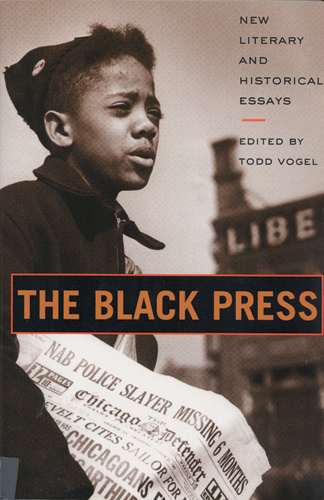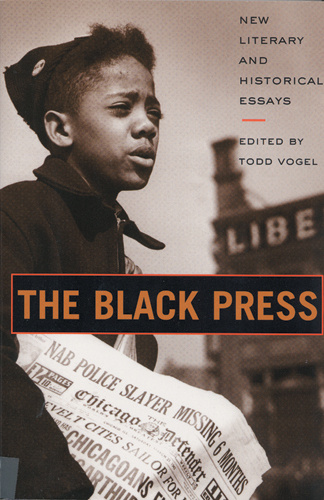In a segregated society in which black scholars, writers, and artists could find few ways to reach an audience, journalism was a means of dispersing information to communities throughout the United States. The black press has offered incisive critiques of such issues as racism, identify, class, and economic injustice, but that contribution to public discourse has remained largely unrecognized until now. The original essays in this volume broaden our understanding of the “public sphere” and show how marginalized voices attempted to be heard in the circles of debate and dissent that existed in their day.
The Black Press progresses chronologically from slavery to the impact and implications of the Internet to reveal how the press’s content and its very form changed with evolving historical and cultural conditions in America. The first papers fought for rights for free blacks in the North. The early twentieth-century black press sought to define itself and its community amidst American modernism. Writers in the 1960s took on the task of defining revolution in that decade’s ferment. It was not been until the mid-twentieth century that African American cultural study began to achieve intellectual respectability.
The Black Press addresses the production, distribution, regulation, and reception of black journalism in order to illustrate a more textured public discourse, one that exchanges ideas not just within the black community, but also within the nation at large. The essays demonstrate that the black press redefined class, restaged race and nationhood, and reset the terms of public conversation, providing a fuller understanding of not just African American culture, but also the varied cultural battles fought throughout our country’s history.
àprovides substantive, multi-dimensioned interpretations of texts and images that gave voice and influence to people marginalized by mainstream society. àThis collection of essays is a welcome addition to the historiography of the black press.
From the antebellum years, when abolitionist Frederick Douglass gained prominence, through the Harlem Renaissance . . . black publications have always flourished. This scholarly collection tracks their history.
This volume is new evidence of the persistent vitality of the black press over more than 170 years. The thirteen essays cover a span from David WalkerÆs Appeal (1829), a pioneering antislavery tract, to Internet editions of black newspapers.
With the essays gathered here, Vogel eloquently demonstrates that the early black pressÆs contribution to African American life and culture and mainstream American culture extended beyond slavery and elite African American issues. . . . This volume will help the reader gain a fuller understanding of not just African American culture but also the varied cultural battles fought throughout the U.S.Æs history. The collection begins in the 1820s with the first print publication, and ends in the twenty-first century with online black presses. . . . The volume combines history, culture, and theory in assessing the value, responsibilities, and challenges of the black press and other ethnic publications, past, present, and future.
Ambitious and wide-ranging, a number of the essays in The Black Press reflect the best and most innovative interpretive strategies in African American and Black diaspora studies.
The work of historical recuperation provided by The Black Press is especially valuable not only for what it tells us about the evolution of black culture in the United States, but also for what it reveals about the undercurrents of American culture at key moments in history.
Introduction / Todd Vogel
Part I The Antebellum Years
Circulating the Nation: David Walker, the Missouri Compromise, and the Rise of the Black Press / Robert S. Levine
The New Face of Black Labor / Todd Vogel
Frederick Douglass's ``Colored Newspaper'': Identity Politics in Black and White / Robert Fanuzzi
``We Hold These Truths to Be Self-Evident'': The Rhetoric of Frederick Douglass's Journalism / Shelley Fisher Fishkin / Carla L. Peterson
Part II After the Civil War
Black Separatism in the Periodical Writings of Mrs. A. E. (Amelia) Johnson / Wendy Wagner
Poetics of Memory and Marginality: Images of the Native American in African-American Newspapers, 1870-1900 and 1970-1990 / Hannah Gourgey
Part III The Harlem Renaissance and the 1930s
Our(?) Country: Mapping ``These `Colored' United States'' in The Messenger / Adam Mckible
``Bombed in Spain'': Langston Hughes, the Black Press, and the Spanish Civil War / Michael Thurston
Part IV World War II and Postwar America
``Kin in Some Way'': The Chicago Defender Reads the Japanese Internment, 1942-1945 / C. K. Doreski
On Sale at Your Favorite Newsstand: Negro Digest /Black World and the 1960s / James C. Hall
``Photographs Taken in Everyday Life'': Ebony's Photojournalistic Discourse / Maren Stange
Black Panther Newspaper: A Militant Voice, a Salient Vision / Rodger Streitmatter
The Black Press in the Age of Digital Reproduction: Two Exemplars / Anna Everett
Contributors
Index





